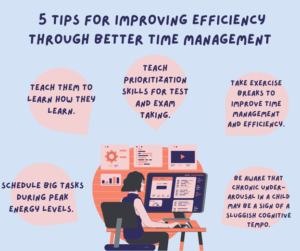“Work smarter, not harder.”
We have all probably heard this phrase before, and while it may seem cliche, there is some wisdom behind it. Working hard is important, but it may not be enough if one’s approach to the work is disorganized and inefficient. While this phrase is often directed toward adults, it is especially important for kids with learning struggles to understand to help them succeed. When children struggle with time management, they may not know how to prioritize tasks like homework and chores over activities they enjoy. Other children display persistence while doing homework but still work very slowly because they lack planning, organization, and time management skills. Thankfully, strategies to improve efficiency through better time management can be taught.
Some kids really struggle with efficiency, and one of the things that might be happening is they could be struggling with their use of executive functions (one of those being time management). Executive functions is one of the things that we examine when we work with kids at South County Child and Family Consultants. At SCCFC we perform neuropsychological evaluations on children to better understand the way their brain works and why they are the way that they are. It’s not uncommon to have problems with executive functioning, as it is a common symptom of ADHD and it is even seen in children with Autism Spectrum Disorder. If you are interested in a neuropsychological evaluation with us to better learn about your child, please contact us below.
Below are 5 useful tips to help improve a child’s efficiency through time management skills.
1. Teach prioritization skills for test and exam taking.
It is not uncommon for a child that is full of knowledge to struggle with taking tests. Kids that are good test takers often know test-taking strategies to help guide them in addition to knowing the material. Teaching your child each of these strategies is not only key to good test taking, they are important time management skills. For example, teach them to respond to the questions they readily know the answer to before returning to the more difficult questions. This allows them to make sure they have enough time to answer the questions they confidently know the answers to, and allows the remaining time for extra critical thinking of the more challenging questions. In regards to essay questions, make sure they know how to create a brief outline to make their writing more structured and easier to write. More general time management strategies for test taking include: teaching the child to maximize the amount of time allowed for the test by sitting towards the front of the class to minimize distractions, teach them to prepare their materials before the exam to ensure they are ready when they receive the exam, and show them how to use a timer or read a clock to determine how much time they have remaining to complete the test.
2. Schedule big tasks during peak energy levels.
Kids often run on a schedule just as adults do; there are times during the day when they are tired and unmotivated, and there are times when they are active and driven. A time management strategy you can help your child with is making note of your child’s most active hours of the day. These hours may vary between children as some are more active in the morning before school and others are more active before bed. Regardless of when their most active hours are, scheduling the child to complete their homework and other important projects or chores during this time is key for time management to increase drive and attention. This is an important time management skill for them to develop on their own so they can recognize when the best time for them to complete tasks is.
3. Teach them to learn how they learn.
Time management difficulties are often seen most within the areas that children struggle with, whether that be math, reading, chores, etc. It is important to observe your child while they are working on these activities and learning these subjects to see if they have a stylistic way of learning. For example, a child that tends to process information at a slower rate may need to be given slow and deliberate directions or hear directions repeated before they can digest all of the information and understand it. Another example is a child that struggles to complete tasks through writing but is able to produce a verbal response. Taking these strengths and weaknesses into consideration is key; make sure you and your child develop insight into their optimal learning approach and apply that as best you can to the way they are learning and completing assignments.
4. Take exercise breaks to improve time management and efficiency.
This is a tip that both children and adults could benefit from as most adults have spent hours inefficiently trying to figure something out when they could have taken a physical break from the assignment and come back to it with a clear mind, finishing it easily and efficiently. When applying this to your child, allow for a 10-15 minute exercise break that includes activities such as running around the house, doing a set of push-ups, or taking the dog out for a short walk. This is extremely helpful for children with attention and learning concerns as physical activity may energize them and make them more efficient. This helps with time management as they are using their time efficiently instead of taking extra time to work on the problem that could easily be solved with a break. Additionally, help your child to identify when they need a break. When they are able to recognize this on their own, it will be helpful to them to take a break when they can feel that they need one. It is important that the child is able to return to the task after the break, this is one area that a parent’s guidance is extra important.
5. Be aware that chronic under-arousal in a child may be a sign of a sluggish cognitive tempo.
Observe your child to see if they are exhibiting symptoms of mental fogginess, a sluggish or lethargic approach to everything, or if they appear to be chronically under-aroused. While these are all signs of Attention Deficit Hyperactivity Disorder, Inattentive Type, it may also be something called a sluggish cognitive tempo. More information on sluggish cognitive tempo can be found in this article by Keath Low, but if this problem becomes persistent then consult with the child’s pediatrician to explore medical or nutritional deficits.
If you are looking to print this document, please select “download this as a pdf” on the top of this page. If you are looking to print the image, please click on the image itself.
If you are local to Rhode Island and are looking to schedule a neuropsychological evaluation with us, please contact us below.
Receive online class information and helpful tips from Dr. Randy Kulman's LearningWorks for Kids |





